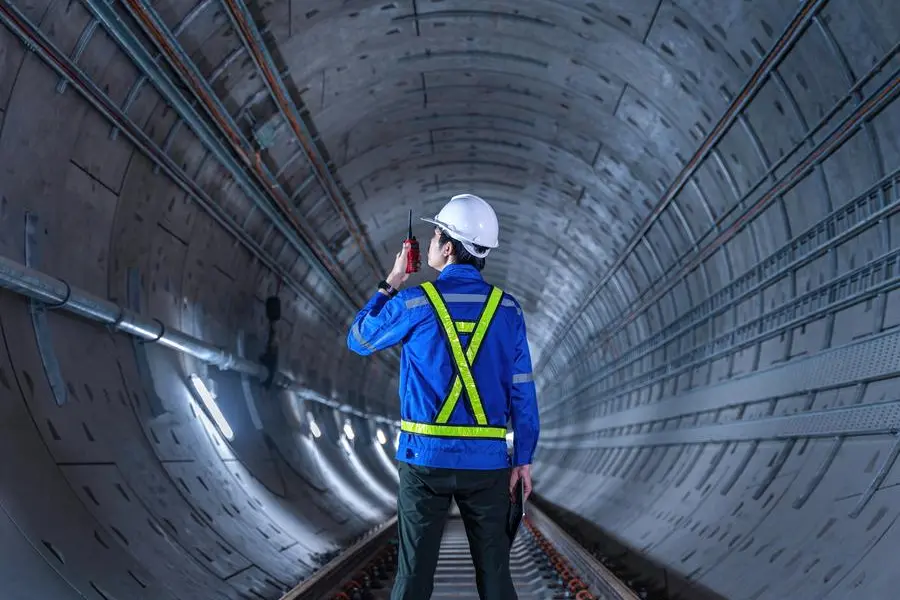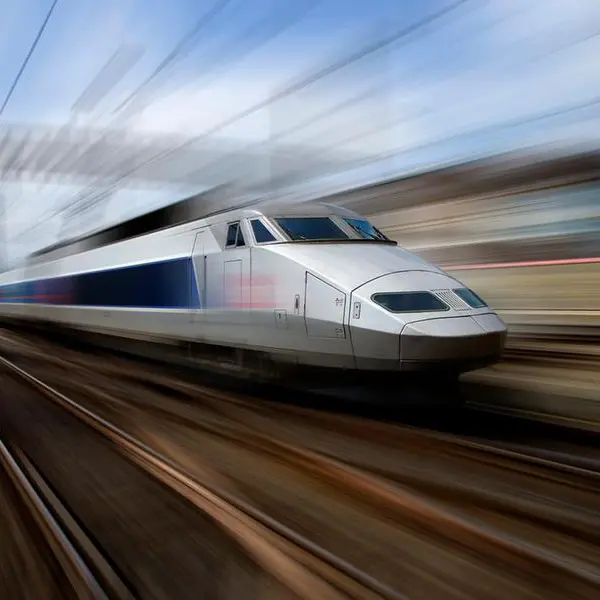PHOTO
AL AQABA - The Ministry of Investment of the UAE and the Ministry of Investment of the Hashemite Kingdom of Jordan have signed an Investment Memorandum, to establish a framework for cooperation in the railway sector.
The memorandum aims to enhance capabilities and facilitate the exchange of knowledge, skills, and technical expertisebetween the two countries. As part of the cooperation between the two ministries, Etihad Rail, the developer and operator of the UAE National Railway Network, signed an agreement with the Jordanian Ministry of Transport to facilitate the implementation of railway projects in Jordan, with the aim of building, developing, and operating a Jordanian railway network spanning 360 kilometres, linking phosphate and potash mines to the Port of Aqaba. Furthermore, the company signed two additional MoUs with Jordan Phosphate Mines Company and Arab Potash Company to transport 16 million tonnes of phosphate and potash annually from mining sites to the Port of Aqaba via the Jordanian railway network.This strategic connection aims to create a transformative shift in the transportation of essential materials, enhance export capabilities, and improve logistical efficiency, thus, creating job opportunities in the transport and mining sectors, and contributing to economic development in the Kingdom.
Under the Investment Memorandum between the two ministries, the railway infrastructure will be developed, including the manufacturing and supply of a fleet of trains designed to the highest international standards. The project will also include the construction of loading and unloading terminals for various mineral products in Aqaba, Ghor Al Safi, and Shidiya. These terminals will facilitate the efficient handling and transportation of minerals, creating more seamless and efficient logistics and export operations. Additionally, the project will comprise maintenance, repair, and operation of the railway network.
Mohamed Hassan Alsuwaidi, Minister of Investment of the UAE, said: “The Investment Memorandum with the Hashemite Kingdom of Jordan showcases our commitment to leveraging our collective and bilateral efforts to drive economic growth, while enhancing resilience and promoting economic diversification in both of our brotherly nations. Through enhancing capabilities and sharing technical expertise, we aim to establish new economic and investment connections that support infrastructure development and foster promising opportunities, all within the framework of our vision to achieve comprehensive and sustainable economic growth.” He added: “This collaborative partnership aligns with our overarching vision to construct a robust and innovative railway network that meets and exceeds global standards, thereby setting the stage for future advancements and prosperity in the region.”
The Prime Minister of the Hashemite Kingdom of Jordan, Dr. Bisher Al-Khasawneh, highlighted during the signing ceremony, which was also attended by the UAE Minister of Investment,
Mohamed Hassan Alsuwaidi, that this significant strategic investment project underscores the deep and amicable bond between the two nations. He emphasised that these ties are nurtured and supported by His Majesty King Abdullah II of Jordan and President His Highness Sheikh Mohamed bin Zayed Al Nahyan.
Dr Al-Khasawneh stated: "Today, we signed Emirati investment agreements valued at US$2.3 billion to connect the Port of Aqaba with the mining areas in Al-Shidiya and Ghor Al-Safi." He noted that these agreements, along with the series of investment initiatives, are part of a broader memorandum of understanding, agreement, and series of investment initiatives that Jordan signed with the UAE in November 2023. This series of investment initiatives, witnessed by His Majesty King Abdullah II and President His Highness Sheikh Mohamed bin Zayed Al Nahyan, totals approximately US$5.5 billion. He added, "We are always pleased with the enduring strategic partnership and close fraternal ties between Jordan and the UAE, which reflect the strong bond between His Majesty King Abdullah II and his brother, His Highness Sheikh Mohamed bin Zayed Al Nahyan."
He emphasised that the signing of these agreements symbolises the deep fraternal and strategic relations between the two nations and serves the mutual interests of both sides. He highlighted that the signed agreements form a comprehensive cooperative framework in the railway sector, aimed at transferring technical expertise and skills related to railway construction and operation. The Prime Minister noted that the project will take five years to commence actual operations, projected for 2030. Detailed studies on railway tracks and the handling requirements for potash and phosphate will be completed by the end of 2025, with the goal of issuing bids for construction work in early 2026.
He explained that the establishment of this railway will greatly enhance our logistical and export capabilities, starting with a capacity of 16 million tons of phosphate and potash products. He highlighted that this crucial project for the Kingdom will connect major mining sites with the industrial port and phosphate port, extending to Wadi Al-Yatam in Aqaba. Additionally, it will improve logistical efficiency and export processes, creating new job opportunities across various fields, including logistics, mining, railways, and other related sectors. Dr Al-Khasawneh also highlighted that the railway route will commence at the phosphate port and the industrial port in Aqaba, extending northward to Wadi Al-Yatam and then to Shidiya. Another route will brand westward from Wadi Al-Yatam to Ghor Al Safi through Wadi Araba. He noted that this project will be implemented under the Jordanian Investment Fund Law and will require five years to be completed.
The Prime Minister expressed his gratitude to the Jordan Phosphate Mines Company and the Arab Potash Company for their constructive engagement during the negotiation phase of this project. He also commended the cooperation shown by the UAE’s Etihad Rail Company. He further extended his thanks to the Emirati partners for their interest in Jordan’s investment environment in general, and in the transport and railway sectors in particular. This interest builds upon the many existing Emirati investments, some of which are set to come to fruition soon in the Aqaba Special Economic Zone. The Prime Minister mentioned ongoing discussions with Emirati partners about revisiting the idea of establishing a dry port in Ma'an. He noted that while it may be premature to discuss this project extensively, the railway initiative lays the groundwork for re-establishing the dry port in Ma'an, enhancing the logistics network and the transport sector in the Kingdom. He also announced the continuation of collaboration with the Emirati partners, which will benefit both countries, emphasising that the two nations operate as 'one body and one mind'. This relationship is strengthened by the strategic and historical ties between their leaderships and peoples, serving as a model for exemplary Arab relation.
Shadi Malak, CEO of Etihad Rail, said: "The agreements and MoUs signed by Etihad Rail reinforce our ongoing commitment to strengthening our presence in the region. This
strategic vision is made possible by the unwavering support of our wise leadership and the guidance of H.H. Sheikh Theyab bin Mohamed bin Zayed Al Nahyan, Chairman of Etihad Rail. We are keen to leverage our proven expertise in developing and operating the UAE National Railway Network to support the Hashemite Kingdom of Jordan's ambitious plans for advancing its rail infrastructure and driving economic growth. This aligns with the strong and cooperative relationship between our two nations, particularly in the implementation of joint projects in the transport and infrastructure sectors, which are mutually beneficial to our nations."
The Jordanian railway network project, which will be implemented by Etihad Rail in Jordan, is characterised by its strategic connection between phosphate and potash mines and the Port of Aqaba – a major port in the Red Sea region. Strategically located between Europe, Asia, and Africa, the port plays a pivotal role in the development of the Jordanian economy, handling most imports and exports to and from the Hashemite Kingdom, including products from the mining industries such as raw phosphate and potash, which are among the most abundant natural resources in the country.
Since its establishment in the UAE, Etihad Rail has been responsible for building, developing, and operating the UAE National Railway Network for freight and passenger transport, and constitutes a key part of the "Projects of the 50," the largest initiative to solidify the strength of the Union for the next fifty years. Since 2016, the company has been operating a route, transporting granulated sulfur from gas production fields in Shah and Habshan to export points at Ruwais Port. In 2023, the UAE National Railway Network was inaugurated, and freight train operations were launched across the UAE. Furthermore, Etihad Rail continues to make progress in developing its passenger transport services, which will operate on the same network in the future. Etihad Rail has achieved remarkable success in its efforts to enhance cooperation with neighbouring countries in the rail transport sector. This is evident through the UAE-Oman Railway Network project, which is being implemented by Etihad Rail, Oman Rail, and Mubadala Investment Company through a joint venture company, Hafeet Rail. This joint network will contribute to strengthening the position of the UAE and Oman as logistical hubs in the region and enhance their role as gateways to regional markets.
This Investment Memorandum follows a US$2 billion agreement signed by the UAE and Jordan in 2023, establishing a framework for investment cooperation in key areas such as infrastructure and development. The UAE is one of the largest foreign investors in the Hashemite Kingdom of Jordan, having invested about US$ 22.5 billion into various key sectors of the country’s economy over the past 10 years





















